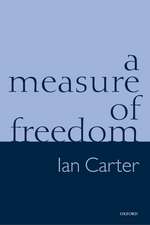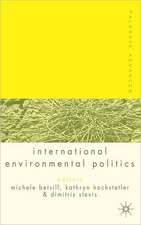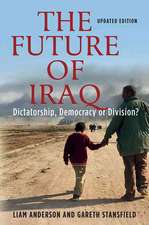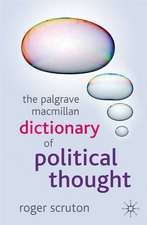The Aftermath of War: Experiences and Social Attitudes in the Western Balkans
Autor Albert Simkus Editat de Kristen Ringdalen Limba Engleză Paperback – 25 mai 2017
| Toate formatele și edițiile | Preț | Express |
|---|---|---|
| Paperback (1) | 416.22 lei 6-8 săpt. | |
| Taylor & Francis – 25 mai 2017 | 416.22 lei 6-8 săpt. | |
| Hardback (1) | 1064.98 lei 6-8 săpt. | |
| Taylor & Francis – 6 dec 2012 | 1064.98 lei 6-8 săpt. |
Preț: 416.22 lei
Nou
Puncte Express: 624
Preț estimativ în valută:
79.65€ • 85.17$ • 66.41£
79.65€ • 85.17$ • 66.41£
Carte tipărită la comandă
Livrare economică 17 aprilie-01 mai
Preluare comenzi: 021 569.72.76
Specificații
ISBN-13: 9781138108127
ISBN-10: 113810812X
Pagini: 334
Dimensiuni: 156 x 234 mm
Greutate: 0.45 kg
Ediția:1
Editura: Taylor & Francis
Colecția Routledge
Locul publicării:Oxford, United Kingdom
ISBN-10: 113810812X
Pagini: 334
Dimensiuni: 156 x 234 mm
Greutate: 0.45 kg
Ediția:1
Editura: Taylor & Francis
Colecția Routledge
Locul publicării:Oxford, United Kingdom
Cuprins
Contents: Preface; Introduction, Kristen Ringdal and Albert Simkus; Solving the mystery of ethnic history: an introduction, Sabrina P. Ramet; War experiences and war-related distress in Bosnia-Herzegovina, Croatia, and Kosovo, Gerd Inger Ringdal and Kristen Ringdal; Changes in war-related distress in Croatia 1996-2004, Gerd Inger Ringdal, Kristen Ringdal and Zan Strabac; Health and happiness in a European comparison, Terje Andreas Eikemo and Kristen Ringdal; Socioeconomic inequalities in health in the Western Balkans, Terje Andreas Eikemo and Kristen Ringdal; Nationality, state and values in the Western Balkans, Albert Simkus; Security dilemmas and ethnic intolerance in the Western Balkans, Tanja Ellingsen, Kristen Ringdal, Albert Simkus and Zan Strabac; Social distance and ethnic hierarchies in Croatia, Zan Strabac; Disaggregating public opinion on the ethnic conflict in Macedonia, Kristen Ringdal, Albert Simkus and Ola Listhaug; Patriarchal value orientations in the Western Balkans, Jelena Pesic; ’The whole universe is heterosexual!’ Correlates of homonegativity in seven south-east European countries, Marija Brajdic Vukovic and Aleksandar Å tulhofer; Post-socialist transformation and value changes of the middle class in Serbia, Mladen Lazi and Slobodan Cveji; Expectations about the present and future of Bosnia-Herzegovina: optimism or pessimism?, Maria Elena Sandovici and Ola Listhaug; Conclusions, Kristen Ringdal and AlbertSimkus; Appendix: data and methods, Kristen Ringdal and Albert Simkus; Index.
Notă biografică
Kristen Ringdal is Professor of Sociology in the Department of Sociology and Political Science, The Norwegian University of Science and Technology (NTNU) in Trondheim, Norway. Albert Simkus is Professor of Sociology in the Department of Sociology and Political Science, The Norwegian University of Science and Technology (NTNU) in Trondheim, Norway.
Recenzii
'The Aftermath of War details social conditions in the Western Balkans ... in the years since the Yugoslav Wars. ... may nonetheless of interest to scholars of the Western Balkans and social scientists engaged in wider cross-national comparisons.' Anthropology of East Europe Review 'The Aftermath of War by Kristen Ringdal and Albert Simkus is the most far-reaching and sophisticated work available on the consequences of the unexpected and brutal war that ended the dream of a united Yugoslavia. It sets important and far-reaching baselines for the study of the health and emotional consequences of war and its effects on tolerance and human relations.’ Randy Hodson, Ohio State University, USA ’This book is a valuable study of societies in the Western Balkans. It is unparalleled in its depth and comprehensiveness in examining attitudes towards identity, modernisation and ethnicity in the region. Future research will be unable ignore the book’s findings. The rich analyses based on an impressive cross-country survey provide for a better understanding of post-war societies and challenge conventional wisdom.’ Florian Bieber, University of Graz, Austria '... the discussions and conclusions of the chapters were certainly illuminating... Among the volume’s chapters are also very interesting and well-researched survey studies of health and happiness and of attitudes to gender roles, patriarchal values, homosexuality and political and economic liberalism. Though not always an easy read, this book contains a lot of valuable information for students of the Western Balkans and of post-war societies and conflict-ridden regions.' Journal of Contemporary European Studies
Descriere
This groundbreaking volume provides a series of analyses of experiences and social attitudes in the Western Balkans in the aftermath of the wars of Yugoslav succession. Based on survey data from 22,000 respondents, the editors have created a volume which contributes to our understanding of both specific war-related effects as well as a detailed description of contemporary attitudes and values across these societies.











